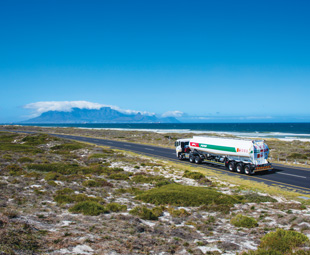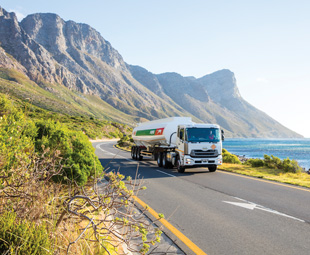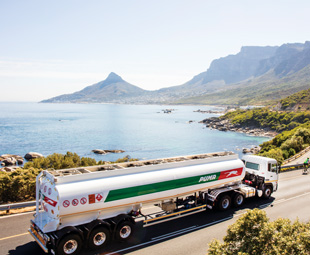No accidents, no harm, no damage

Companies that are involved in the supply and distribution of petrochemical products are assisting transport operators in a bid to ensure safe transportation of hazardous goods. CLAIRE RENCKEN reports.
According to Sanet Pake, regional supply and logistics manager, Puma Energy: “We believe that, as a company, we carry the usual operational and safety responsibilities associated with the service, but also have a general social and moral obligation to ensure that operations take place in accordance with the highest standards.
“Puma Energy earns its income out of society, and thus has to ensure that it operates in a socially responsible manner. As such, Puma has adopted a policy of ensuring that the complete transport operation, involving the carriage and distribution of Puma products, will be conducted so as to effectively take into account the safety of Puma and its employees, as well as that of society as a whole.”
Therefore, Puma has decided to take the lead in making sure that the application of such standards by the industry will be regarded as the norm. Furthermore, Puma has also undertaken to provide all possible assistance to transport operators to enable them to operate to the highest possible reasonable standard, and as socially responsible corporate citizens.
The Puma Energy philosophy regarding safety is based on the belief that:
• all accidents are preventable;
• safety belongs to all employees within the workforce;
• management is accountable for safety; and
• working safely is a condition of employment.
 Sadly, accidents involving road tankers continue to occur, despite significant improvements in vehicle design and road systems. The situation is aggravated further by the increase in the number of heavy vehicles on the roads.
Sadly, accidents involving road tankers continue to occur, despite significant improvements in vehicle design and road systems. The situation is aggravated further by the increase in the number of heavy vehicles on the roads.
“Growing awareness among the general public, regulators and company shareholders has dictated that Puma Energy (which has an international reputation to protect) cannot accept that people can be injured or killed, or that the environment can be damaged during the course of carrying out its activities,” explains Pake.
“We have, therefore, put together the Puma Energy Road Transport Manual, to ensure that all contractors and their employees who transport Puma Energy products, have a clear understanding of Puma Energy’s requirements with regard to the potential hazards associated with the handling and transportation of petroleum products, as well as the precautions that need to be taken,” she continues.
Pake reveals that research in safety and quality control has identified that more than 80 percent of all substandard or unsafe acts are the result of factors over which management has direct control. Typically, in road transportation, these factors would include training, procedures, vehicle design and maintenance, inspections and emergency preparedness.
“These areas of management controls, and what is expected in terms of Puma Energy requirements, are fully explained in this document. When these standards and associated procedures are followed, petroleum products can be worked with safely and effectively.
 “Failure to comply with the Puma Energy requirements will result in the termination or suspension of the contract,” she adds. “Our goals are simply stated – no accidents, no harm to people and no damage to the environment.”
“Failure to comply with the Puma Energy requirements will result in the termination or suspension of the contract,” she adds. “Our goals are simply stated – no accidents, no harm to people and no damage to the environment.”
There are, of course, also South African National Standards (SANS) that have to be adhered to by all transporters. Some of these are in the process of being updated. This was discussed at the Road Freight Association (RFA) Convention earlier this year.
Gavin Kelly, technical and operations manager at the RFA, sheds some light: “Standards are reviewed every two years through normal processes – sometimes resulting in just a ratification process that the standards are still valid. Other times they require a rewrite, due to changing technology, product specifications, or new safety standards as a result of incidents that may have happened.
“Some of the SANS standards are closely aligned to international trends and standards – due to import requirements of other countries, or developments in the United Nations (UN) committees relating to the transport of dangerous goods,” he says.
“This is true of the series of standards that deal with manufacture of containers, packaging and transportation in bulk vehicles (more often with regard to the liquid bulks relating to chemicals and flammable substances).”
Kelly explains that various working groups, subcommittees and technical task teams (comprising experts from all the spheres relating to specific categories of dangerous goods) review and adapt standards as required. “Bulk liquid tanker standards are currently undergoing this process to update the local standards – SANS1518 for example – in line with the UN standards,” he concludes.
Published by
Focus on Transport
focusmagsa




